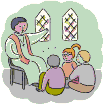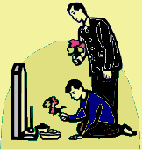|
Funerals and Children
Funerals and Children - should a child attend a funeral? There are no hard and fast rules in funeral etiquette that dictate whether children should or should not attend a funeral.
The only way this topic falls under the theme of Funeral Etiquette is that any form of inconsiderate or disruptive behaviour would be considered extremely bad etiquette and in poor taste. Therefore parents should keep in mind the fact that all little ones can be quite noisy and disruptive and a funeral is not the appropriate time or place for this to be happening. However, as this is a question that is asked over and over again, we have included the results of our research on this topic. Funerals and Children - from what age should they be permitted to attend? If the child is very young they may not fully understand what is happening and may not benefit from attendance. In fact a little one may feel confused and upset if they see people distressed and crying. It could also have a negative psychological impact on a very young mind. Only you, the parent will be able to judge just how much the child can take in and understand without it being confused and afraid.
Funerals and Children - children also suffer grief Children suffer grief just as adults do. Don't try to keep them from knowing what is happening. They need to understand what is happening so that they too can work through their grief and find closure. Saying goodbye is important. The best thing to do is to talk to the child, ask how they are feeling and answer their questions about what a funeral is and what will happen there. It's a good idea to prepare a child beforehand so they know what to expect. As much as we want to protect our children from all pain and sorrow, we cannot protect them from knowing about death and loss. Funerals and Children - what about open coffins and viewing? If the body will be viewed either at a visitation or at the funeral itself, let the child know this in advance. Explain what the casket and the body will look like. If the deceased is to be cremated, explain what cremation means and what will happen to the ashes. Be sure the child understands that because the person is dead, he doesn't feel pain or anything at all during cremation or burial. Perhaps tell them the body is only a vehicle to help us while we are here. Funerals and Children - should the child make the decision? If the child was close to the deceased it is fine for the child to attend if he or she feels comfortable doing so. If the child is old enough, leave the decision up to them. However, make sure the child really understands what you are discussing and what is happening. Don't be afraid to ask questions and encourage the child to talk openly. The actual burial could be an upsetting experience for a child who has no idea what is happening or what to expect.
Funerals and Children - help the child to understand Help the child to understand why we have funerals. Children need to know that the funeral is a time of sadness because someone has died, a time to honor the person who died, a time to say a final goodbye, a time to help comfort and support each other and a time to affirm that life goes on.

Funerals and Children - a time to say goodbye Funerals are also a time to say good-bye. And saying good-bye helps us all acknowledge that the person we loved is gone and cannot come back. If the body is to be viewed, tell the child that seeing the body helps people say good-bye and that if he or she wants, they may touch the person he loved one last time.
Remember to use simple and easy to understand terms when talking to children about death and funerals. Here are some suggestions for explaining some funeral terms: Ashes (also "cremains") What is left of a dead body after cremation. Looks like ashes from a fire.
Burial Placing the body (which is inside a casket) into the ground.
Casket A special box for burying a dead body.
Cemetery A place where many dead bodies are buried.
Cremation Putting the dead body into a room with lots of heat until it turns into ashes.
Dead When a person's body stops working. It doesn't see, hear, feel, eat, breathe, etc. anymore.
Funeral A time when friends and families get together to say goodbye and remember the person who died.
Funeral home A place where bodies are kept until they are buried.
Grave The hole in the ground where the body is buried at the cemetery.
Hearse The special car that takes the dead body in the casket to the grave at the cemetery.
Obituary A short article in the paper that tells about the person who died.
Pallbearer The people who help carry the casket at the funeral.
Viewing The time when people can see the body of the person who died.
Funerals and Children - let the child feel part of it .. Bereaved children feel like their feelings "matter" when they can share a favorite memory or read a special poem as part of the funeral service. Some children may prefer to participate by lighting a candle or placing something special in the casket and many children feel more included when they are invited to help plan the funeral service. Encourage, explain, but never force ... You may also be interested in...
Can't find what you are looking for? Try our Google Search below:
We would love you to share your experiences and views on our Interactive Visitors Forum - Funerals and Children. Your contribution, if appropriate, may be published in our Rage Page. Back to our A to Z Guide.
|



